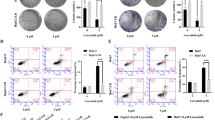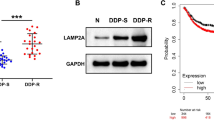Abstract
Lung cancer (LC) is a major cause of death worldwide, and cisplatin is commonly used as a chemotherapeutic drug for the treatment of LC. However, high doses of cisplatin can reduce its efficacy, leading to the need for new methods to increase LC cell sensitivity to this drug molecule. To overcome this problem, it is important to discover new methods to increase the sensitivity of LC cells to cisplatin. In this study, we investigated the use of anti-let-7a, a microRNA, to enhance the cisplatin sensitivity in A549 LC cells by comparing its effects with the commonly used oncogenes akt1 and pik3ca. The A549 cell line was transfected with anti-let-7a, and its effects were analyzed using functional assays. MTT (3-(4,5-dimethylthiazol-2-yl)-2,5-diphenyl-2H-tetrazolium bromide) assay was used for the measurement of cell viability, and gene expression levels of cell death–associated genes, were analyzed by using quantitative real-time PCR (qRT-PCR). Results showed that anti-let-7a downregulation decreased the viability of A549 cells significantly compared to the control group in the presence of cisplatin. Moreover, the single treatment of cells with anti-let-7a and cisplatin resulted in significant changes in gene expression levels, with the increased expression of pro-apoptotic genes and decreased expression of anti-apoptotic genes. Moreover, anti-let-7a treatment was found to increase the response of A549 cells to cisplatin by reducing the expression of oncogenes akt1 and pik3ca. This study suggests that anti-let-7a treatment may enhance the A549 LC cell sensitivity to cisplatin by modulating the expression of akt1 and pik3ca genes, making it a promising therapeutic target for LC treatment.







Similar content being viewed by others
Data availability
Some data are available on request.
References
Azizi MIHN, Othman I, Naidu R (2021) The role of MicroRNAs in lung cancer metabolism. Cancers 13(7):1716
Bade BC, Cruz CSD (2020) Lung cancer 2020: epidemiology, etiology, and prevention. Clin Chest Med 41(1):1–2
Barta JA, Powell CA, Wisnivesky JP (2019) Global epidemiology of lung cancer. Ann Glob Health 85(1):8. https://doi.org/10.5334/aogh.2419
Cacioppo R, Akman HB, Tuncer T, Erson-Bensan AE, Lindon C (2023) Differential translation of mRNA isoforms underlies oncogenic activation of cell cycle kinase Aurora A. Elife 12:RP87253. https://doi.org/10.7554/eLife.87253
Cao M, Chen W (2019) Epidemiology of lung cancer in China. Thoracic Cancer 10(1):3–7
Chen Y, Gao Y, Zhang K, Li C, Pan Y, Chen J, ..., Chen L (2015) MicroRNAs as regulators of cisplatin resistance in lung cancer. Cell Physiol Biochem 37(5):1869–1880
Eslamkhah S, Alizadeh N, Safaei S, Mokhtarzadeh A, Amini M, Baghbanzadeh A, Baradaran B (2021) Micro RNA-34a sensitizes MCF-7 breast cancer cells to carboplatin through the apoptosis induction. Gene Reports 25:101361
Hanna J, Hossain GS, Kocerha J (2019) The potential for microRNA therapeutics and clinical research. Front Genet 10:478
Howlader N, Forjaz G, Mooradian MJ, Meza R, Kong CY, Cronin KA, ..., Feuer EJ (2020) The effect of advances in lung-cancer treatment on population mortality. N Engl J Med 383(7):640–649
Inoue J, Inazawa J (2021) Cancer-associated miRNAs and their therapeutic potential. J Hum Genet 66(9):937–945
Iqbal MA, Arora S, Prakasam G, Calin GA, Syed MA (2019) MicroRNA in lung cancer: role, mechanisms, pathways and therapeutic relevance. Mol Aspects Med 70:3–20
Mattiuzzi C, Lippi G (2019) Current cancer epidemiology. J Epidemiol Glob Health 9(4):217
Rosenwald S, Gilad S, Benjamin S, Lebanony D, Dromi N, Faerman A, ..., Aharonov R (2010) Validation of a microRNA-based qRT-PCR test for accurate identification of tumor tissue origin. Mod Pathol 23(6):814–823. 13-15
Ruiz-Cordero R, Devine WP (2020) Targeted therapy and checkpoint immunotherapy in lung cancer. Surg Pathol Clin 13(1):17–33
Schabath MB, Cote ML (2019) Cancer progress and priorities: lung cancer. Cancer Epidemiol Biomark Prev 28(10):1563–1579
Shirjang S, Mansoori B, Asghari S, Duijf PH, Mohammadi A, Gjerstorff M, Baradaran B (2019) MicroRNAs in cancer cell death pathways: apoptosis and necroptosis. Free Radical Biol Med 139:1–15
Sun B, Liu C, Li H, Zhang L, Luo G, Liang S, Lü M (2020) Research progress on the interactions between long non-coding RNAs and microRNAs in human cancer. Oncol Lett 19(1):595–605
Vinciguerra A, Cepparulo P, Anzilotti S, Cuomo O, Valsecchi V, Amoroso S, ..., Pignataro G (2020) Remote postconditioning ameliorates stroke damage by preventing let-7a and miR-143 up-regulation. Theranostics 10(26):12174
Visconti R, Morra F, Guggino G, Celetti A (2017) The between now and then of lung cancer chemotherapy and immunotherapy. Int J Mol Sci 18(7):1374
Xie S, Wu Z, Qi Y, Wu B, Zhu X (2021) The metastasizing mechanisms of lung cancer: recent advances and therapeutic challenges. Biomed Pharmacother 138:111450
Yi M, Xu L, Jiao Y, Luo S, Li A, Wu K (2020) The role of cancer-derived microRNAs in cancer immune escape. J Hematol Oncol 13(1):1–14
Acknowledgements
I would like to thank all the authors for their valuable contributions.
Author information
Authors and Affiliations
Contributions
Conceived and designed study: ESA, Collected data: ESA and EA. Analysis and interpretation of data: ESA and EA, Drafting: EA, critically revising: ESA. The authors declare that all data were generated in-house and that no paper mill was used.
Corresponding author
Ethics declarations
Ethical approval
Not applicable.
Competing interests
The authors declare no competing interests.
Additional information
Publisher's Note
Springer Nature remains neutral with regard to jurisdictional claims in published maps and institutional affiliations.
Rights and permissions
Springer Nature or its licensor (e.g. a society or other partner) holds exclusive rights to this article under a publishing agreement with the author(s) or other rightsholder(s); author self-archiving of the accepted manuscript version of this article is solely governed by the terms of such publishing agreement and applicable law.
About this article
Cite this article
Aslan, E.S., Aydin, E. Investigating the role of let-7a microRNA in cisplatin sensitivity of A549 lung cancer cells. Naunyn-Schmiedeberg's Arch Pharmacol 397, 3979–3984 (2024). https://doi.org/10.1007/s00210-023-02858-y
Received:
Accepted:
Published:
Issue Date:
DOI: https://doi.org/10.1007/s00210-023-02858-y




